Spinning Straw Into Gold With Chemical Upcycling
Upcycling diverts waste by converting it to high value materials.
Recycling is a term with considerable cachet and a definition flexible enough to be applied to a wide variety of processes. Naturally, modifiers have been invented to distinguish and divide processes into various categories. The terms “upcycling” and “downcycling” denote processes that increase or decrease the value of a material.
A colorful quote from engineer Reiner Pilz (“Recycling? I call it DOWNcycling. They smash bricks, smash everything. What we need is UPcycling...”, from Salvo News 1994) is often cited as the origin, but the concept predates the interview by at least a decade. Pilz may not have hatched the term, but he exemplified it: cleverly designing custom interiors, made from architectural rubbish with minimal modification, creating high value from essentially zero.
The distinction promotes recycling activities that increase the value of the material used, and deprecates those that decrease it. Processing steps that increase value are more likely to be economically viable and more likely to supplant unsustainable production methods. Despite this, downcycling still makes up a large share of the plastic recycling industry. Mechanical recycling processes, preferred because of their low energy requirements, degrade plastics with each cycle, reducing molecular weight and therefore mechanical properties. While there are some closed loop processes out there, notably bottle-to-bottle PET recycling, most recycled plastics cannot be returned to the same or higher purpose.
California-based Novoloop has devised a means to upcycle the most common post-consumer waste plastic, increasing its value 50 to 80X. Its product is a thermoplastic polyurethane (TPU) made with recycled PE. TPU is known for its high abrasion resistance, making it ideal for applications where durability is critical, such as cell phone cases, automotive panels, and cable jacketing. In September, the Swiss running brand On announced its Cloudprime running shoe, a collaboration between multiple companies incorporating a variety of sustainable technologies. Novoloop TPU is being used to make the outsole.

On’s Cloudprime shoe features Novoloop TPU outsole, with 32% post consumer recyclate.
Photo Credit: On
Last month, I spoke with Novoloop CEO Miranda Wang at the 2022 K show in Germany.
“Jeanny (co-founder Jeanny Yao) and I were in high school when we visited a waste transfer facility. We were shocked to see the plastic waste that was not being recycled,” said Wang. Wang and Yao founded Novoloop, originally called Biocellection, in 2015 and developed the accelerated thermal oxidative decomposition (ATOD) that formed its basis.
Novoloop’s ATOD process breaks postconsumer PE down into diacid molecules. In a single step, the waste is purified, any dye is removed, and the diacid created, which is subsequently used to produce TPU. The process temperature and pressure are much lower than pyrolysis, according to Wang, and it produces a product that is structurally closer to a finished material.
“Sometimes the concept of circularity is applied too narrowly,” said Wang. “We are part of a bigger loop, like we see in nature, where recycling includes transformation. When a tomato plant breaks down, its nutrients may not become another tomato plant, they may become part of a tree. We don’t have to oversimplify the molecules by taking them back to base chemicals, which we would then have to expend energy to repolymerize.”
Further, the TPU produced from these diacid building blocks is a drop-in solution that requires no further modification by the customer. In the case of footwear, rubber pads can be replaced with thinner pieces of TPU with longer wear times thanks to the material properties. TPU is itself melt-recyclable, raising the possibility of further recycling loops enabling many lives for products made from Novoloop’s material.
Novoloop is currently using a pilot facility in California to create the TPU resin. The company plans to build and operate a new facility, to ramp up production to supply customers engaged in a variety of segments, potentially including automotive, bonding products, and sporting goods in addition to footwear.
The On Cloudprime shoe is not yet available to the public, but a small number have been manufactured and are being tested by elite distance runners.
Related Content
ABC Technologies to Acquire Windsor Mold Group Technologies
The Tier One automotive supplier with compounding and blowmolding machine capabilities adds the 50-yr-old molder and moldmaker.
Read MoreMedical Molder, Moldmaker Embraces Continuous Improvement
True to the adjective in its name, Dynamic Group has been characterized by constant change, activity and progress over its nearly five decades as a medical molder and moldmaker.
Read More‘Monomaterial’ Trend in Packaging and Beyond Will Only Thrive
In terms of sustainability measures, monomaterial structures are already making good headway and will evolve even further.
Read MoreFoam-Core Multilayer Blow Molding: How It’s Done
Learn here how to take advantage of new lightweighting and recycle utilization opportunities in consumer packaging, thanks to a collaboration of leaders in microcellular foaming and multilayer head design.
Read MoreRead Next
Why (and What) You Need to Dry
Other than polyolefins, almost every other polymer exhibits some level of polarity and therefore can absorb a certain amount of moisture from the atmosphere. Here’s a look at some of these materials, and what needs to be done to dry them.
Read MoreUnderstanding Melting in Single-Screw Extruders
You can better visualize the melting process by “flipping” the observation point so that the barrel appears to be turning clockwise around a stationary screw.
Read MoreHow Polymer Melts in Single-Screw Extruders
Understanding how polymer melts in a single-screw extruder could help you optimize your screw design to eliminate defect-causing solid polymer fragments.
Read More




















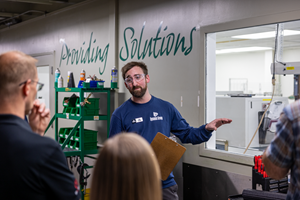
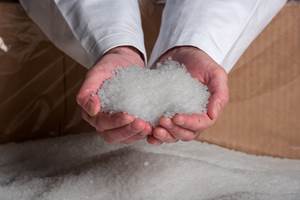
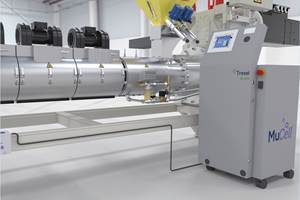
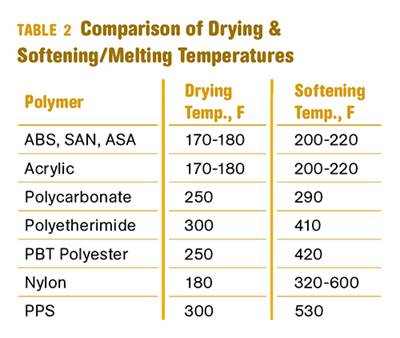
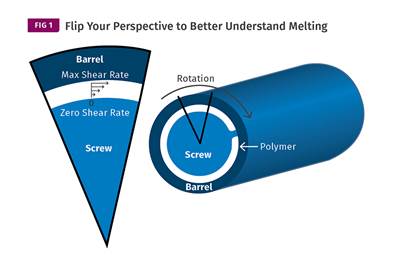

.png;maxWidth=970;quality=90)